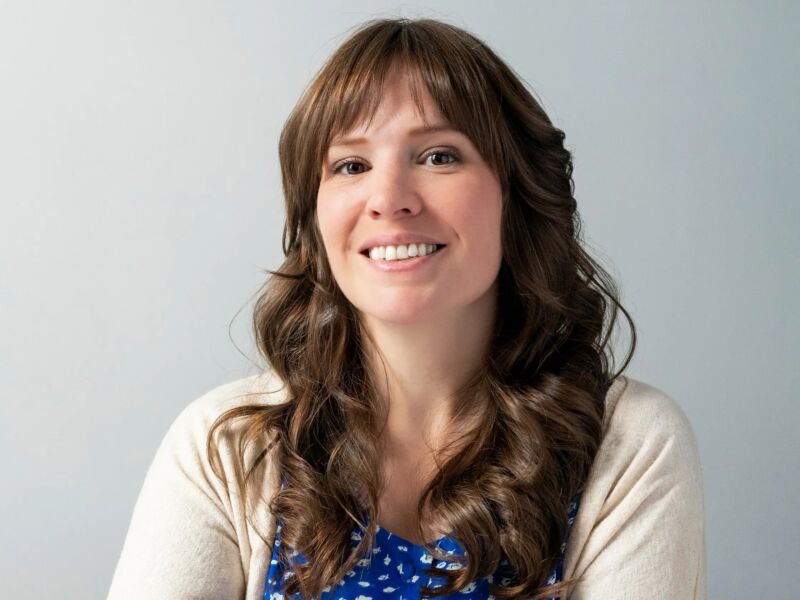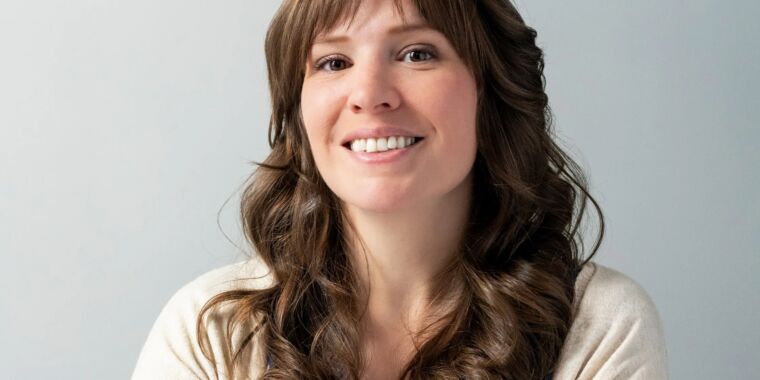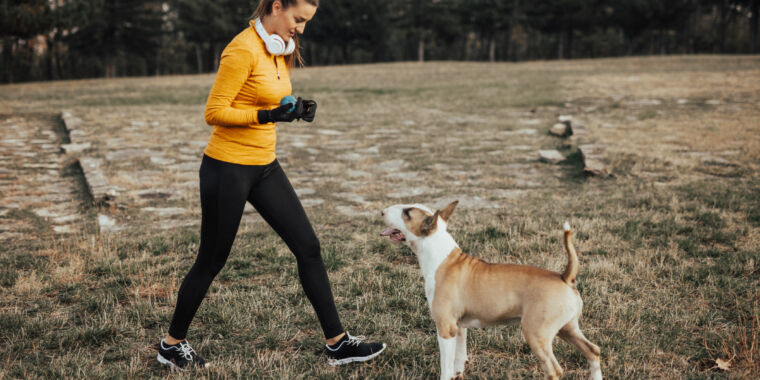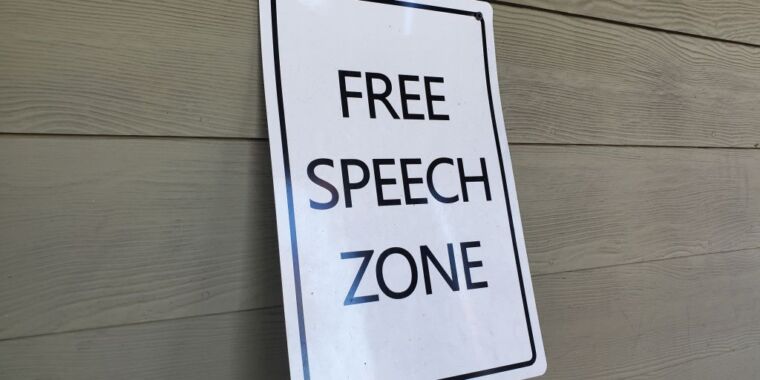
Corey Katz / Kate Beaton
For those who paid attention to the webcomics scene of the 2010s or simply enjoy good humor writing, the name Kate Beaton is likely a familiar one. The Canadian cartoonist’s Hark a Vagrant—a dizzying mix of the literary and historical references, lack of respect for institutions that didn’t deserve any, and gleeful silliness that ran through 2018—was a staple of Best Of lists for years, whether online or in its two print collections.
Outside of that work, Beaton has created kids’ books (The Princess and the Pony and King Baby, which both won awards) and earlier this year an animated series based on one of those books: Pinecone & Pony on Apple TV+.
This week her latest project hits shelves, and it’s arguably her greatest achievement to date. Ducks: Two Years in the Oil Sands is a memoir of her experiences working in the Athabasca oil sands in northern Alberta. It’s a serious, moving, and heartfelt piece of cartooning that is as kind as it is fearless and easily one of the most impressive graphic novels of this year, or works of any kind in the past decade.

WIRED caught up with the author via email to ask about her memoir, the end of Hark a Vagrant, and teaching readers about life in the oil sands of Canada.
WIRED: Ducks is utterly devastating. It feels, as a reader, as if it’s something that you’ve been working toward for some time. I know you published an early, and significantly different, version of this as a webcomic in 2014. One of the things that both versions share is a sense of, perhaps, emotional disconnection, a feeling of being so overwhelmed that it was nearly impossible to share what it had actually been like. How did you overcome that to make this book?
Kate Beaton: Hmm. I’m not sure if I agree with the question. I don’t think I have an emotional disconnection or ambivalence. If anything, too much of the opposite.
It’s my intense connection and deep concern that make it a hard and impossible story to tell—as soon as I describe one thing, I feel bad that I did not describe three other things to make sure that I am giving the full picture, because there is no one detail that will make you understand what I want to show you; the contradictions are endless, the complexity enormous.
If I started talking about the oil sands to someone, I couldn’t stop, because there was no point at which I could be satisfied I’d explained it. I needed editors to help make this book so that it wasn’t 2,000 pages—and it’s still 500 pages, and there’s all kinds of things missing. But that’s probably for the best. It has to be a readable book.
How long was this in the works? You mentioned when you closed down Hark a Vagrant way back in 2018 that you were working on a graphic novel. Was that Ducks?
The book was in the works since 2016, I pitched it to Drawn and Quarterly in the summer of 2016.
I took a year to write it. I took several years to draw it. In between, there were a few stops and starts. I had two children, and I lost my sister Becky to cancer. Becky is in the book. There were long periods then when I wasn’t working on it but it was always on my mind. I’m sure it was helpful, but also it’s just the way it was.
Does now feel like the right time to tell this story, compared with 2014? Or, perhaps, is it a case of you being better equipped to handle it now?
In 2014, I was just in my studio and I was compelled one day to start drawing out those comics. I later called them a “test,” but at the time it was just something I was driven to do for their own sake, and as I was doing it, you could see the bigger picture emerging of what it could be. I guess I always thought this was a book I’d make, but that really made it clear that I could.
But I couldn’t do it right then. I had a picture book I was working on; I couldn’t fathom leaving Hark a Vagrant right away. But I started winding down to it. I mean—I started the book in 2016, not that long afterward, so it’s not really a question of 2014 versus 2022, it’s just that it took this long to make the book.
One of the things that sticks with me about it is how kind it is. I feel you take great pains to emphasize that the experience of working in the oil sands dehumanizes everyone to some extent, no matter how they may believe they’re responding to it. Was that an attitude you’ve always had in this context, or was it something that came as you looked back on everything?
I’ve always had it. I didn’t come back to reflect only to find that everyone was human after all, haha. I lived with these people, they were my friends, my coworkers, my neighbors. And even when things are grim, I can see what I’m looking at. Even if it hurts.
Of course, I have had many years to think about it, too, and to get older myself, and I am sure that has made a difference at a gradient—hopefully the slow onset of wisdom. But, you care about the people you are surrounded by, don’t you?
Perhaps I’m betraying my own shortsightedness, but I had no idea of what the oil sands were, or what working there was like. The book feels very educational in that respect.
I know a lot of readers won’t know much about the oil sands. If you don’t have a connection to it, you might only have a sense of it being a place that is, you know, big and ponderous and full of dump trucks and environmental issues and money.
Luckily for those readers, I didn’t know much about it myself when I landed there, and everything in the book is from my point of view, and the reader is dropped in those shoes to learn as I learn what they are looking at. So in that sense, a gradual education works out by design and naturally, as it did for me.
Are you nervous about what audiences will make of the book? It uses all the tools you developed during Hark a Vagrant, but with a very different direction and ambition than that project, which was at heart a humor strip.
I’m not nervous about what audiences who are used to Hark a Vagrant will make of it. I think anyone who has followed me and my work for a while has a sense of who I am and where I’ve been going and what I have to say, even if this is a much different book.
I am more nervous about making a book about what people consider a very polarizing topic here in Canada. I’m not sure what will come with that. But all I could do was tell things with honesty.
How has making Ducks impacted what you’re doing moving forward? I feel like If I Cannot Have My Own on your Patreon demonstrates a similar tone, as well as a similar sense of pacing, for example.
Well, that is a story I have had in my head for probably a decade, so I don’t know about that. It’s loosely based on an anecdote my dad told me a long time ago that I thought about and spun around.
I think what is more likely is that I had these things in me but I kept making Hark a Vagrant for maybe longer than I should have—or not should have, but something like that. I have no regrets. We all have to grow and change. Losing my sister the way we did, how terrible it was, made me lose all will to write jokes for a living for a long time. Although now that I have finished Ducks, maybe that will come back.
That leads into my last question: How does it feel having finished the book? There’s such a feeling of it being an intense, personal experience that I wonder if it is a relief to be able to share it.
Well, I am answering this before the book is fully out in the world, so it is hard for me to say. It is still in that in-between time where not many have read it. I don’t know what’s going to happen. I hope it will be good. I hope I’ve done good.
This story originally appeared on wired.com.
Ars Technica may earn compensation for sales from links on this post through affiliate programs.








